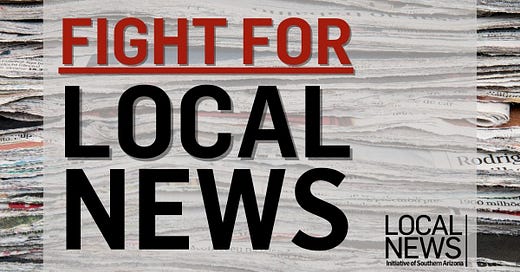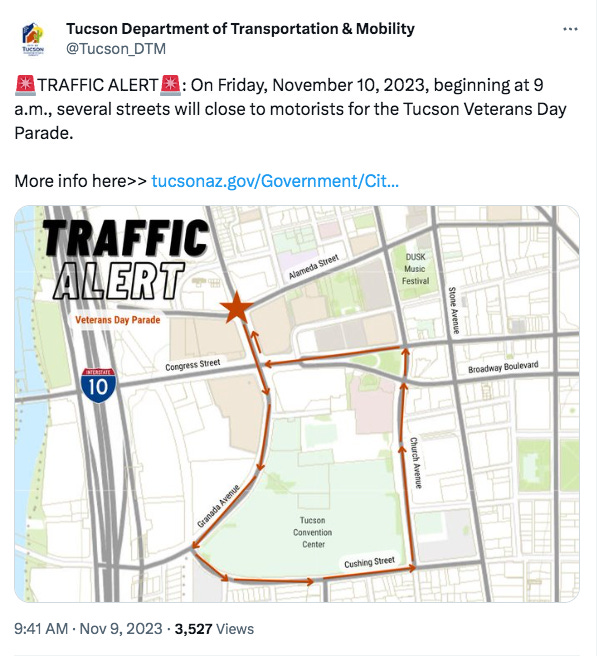The Daily Agenda: Better news, better city
A Tucson group launched a $1 million fundraising effort for local, independent news … This could be a game changer … TUSD now has a lot of bond money to spend.
Local news is in crisis. That’s why we launched the Tucson Agenda — and if you’re a subscriber, you’re probably also aware of the problem.
Since 2005, more than 2,000 newspapers have closed their doors, and 60% of journalism jobs in the U.S. have disappeared since 2008.
We’ve felt the impact locally, with two devastating rounds of layoffs at the Arizona Daily Star in the past year, the second of which inspired our launch.
But a lot of people don’t know just how dire the situation is or what the consequences are for under-covered and under-informed communities.
Fewer people vote and get involved in local politics in communities that lack robust news coverage. Those communities also see more government corruption and more political polarization due to misinformation.
That’s why a group of Tucsonans banded together to get the word out and raise some much-needed funds to support local reporting along the way.
The Local News Initiative of Southern Arizona launched yesterday with the goal of raising $1 million over the next year to help support local, independently owned outlets like the Agenda. Its advisory board includes people with decades of experience in the journalism industry and deep ties to Southern Arizona.
The initiative is housed within the Community Foundation for Southern Arizona and will be raising both local and national funds to help pay for positions and bring more local news coverage to our communities early next year.
This is exciting news for the Agenda. We’d love to hire more reporters and bring our readers more news, but we still haven’t earned enough to pay ourselves a living wage. (But we’re getting closer!)
After just four months of publishing, we’re more than halfway to being financially sustainable. If you upgrade to a paid subscription, you’ll help us make it all the way!
It’s also good news for our industry colleagues at outlets like Arizona Luminaria and Tucson Sentinel. And honestly, it’s good news for all of Southern Arizona. A more informed community is a stronger community, and with a big 2024 election on the horizon and critical issues at stake, we need local coverage now more than ever.
The initiative already secured a $100,000 grant from the Democracy Fund, but organizers say the ability to demonstrate strong local support will help attract more national dollars.
While the initiative is new, the group behind it has been working towards this for more than a year, talking with community members and industry experts about the steady decline in local news coverage and journalism in Tucson, Pima County and other parts of Southern Arizona.
And they want to keep talking with people through an online survey in both English and Spanish, with questions including:
Have you noticed a decline or improvement in local news coverage about your community?
How does local journalism and reliable news affect your life?
How can we help make local news media more inclusive and equitable?
What are some of the types of news and information that are important to you?
The survey also asked respondents to rank how well local media is covering issues like schools, government, the border and the economy and what other areas of coverage they think are important.
The group is hoping to help fill the gaps in public affairs reporting in Pima County and beyond in advance of next year’s election, which will bring plenty of national attention to the state, according to the group’s philanthropic advisor, Kadi Tierney.
“For better or worse, the state of Arizona has become a little bit of ground zero in terms of what is going to happen to the future of democracy,” Tierney said. “This is not a partisan issue, this is not a political issue. This is a little bit more about a national identity and constitutional issue.”
And while Southern Arizona still has a newspaper and isn’t officially a news desert, advisory board vice chair and former New York Times journalist Stephen Golden said it’s no longer serving the needs of the community and is lining the pockets of corporate leaders in other states.
“The fine people who work at our local newspaper can’t battle against what’s been happening to decimate our local newspaper,” Golden said. “But (the Star’s owners) Lee and Gannett… they’re still taking $10 million a year out of this community. And they’ve taken it out of your brains because you’re not getting the information that you want and that you need.”
But it’s not just about more news, it’s about making sure the news coverage is representative of the community and that it’s accessible, said our former Star coworker, Liliana López Ruelas, who is also on the initiative’s advisory board.
“You can’t say journalism is a pillar of democracy if it’s only available to those who can pay for it,” she said.
We agree, and that’s why we want to make sure everyone has access to the Agenda. But we can’t do that without you, so we’re very grateful to the 501 of you who have chosen to pay for your subscription.
We know not everyone can afford to pay, and that’s another reason why we think the initiative can benefit the Agenda and our readers. Increasing the size of our staff means we can produce more news, bring in more paying subscribers and seek out other funding opportunities to ensure that we can keep the Agenda paywall-free.
More news and free news is better for everyone, and we hope the community agrees. The stakes are high, but the results could be life-changing.
“We can fund this … and be one of the best informed communities in the region for the democracy that hangs in the balance,” Tierney said.
Grisly end: The controversy over 300 small animals that were transferred from San Diego to the Humane Society of Southern Arizona has a new, ominous wrinkle. A Phoenix-area reptile breeder, who is the brother of the man the Humane Society transferred the animals to, sent a text message indicating the animals met a grisly end, KVOA’s Myles Standish reports.
“The text said: ‘Do you have the ability to freeze off a bunch of guinea pigs and or rabbits? I don’t have the manpower or labor to be able to do it in time for the show and it’s too much time for me,’” Standish reported.
First things first: Fire alarms, door locks, and air conditioning are among the top priorities for Tucson Unified School District officials as they plan how to spend the $480 million bond package voters approved Tuesday, the Arizona Daily Star’s Jessica Votipka reports. Next week, the TUSD governing board is going to set up a bond oversight committee to keep an eye on all that spending.
Final tallies: Pima County elections officials had tallied about 95% of votes from Tuesday’s elections by Wednesday. They expect to tally the remaining 19,000 ballots by late Thursday or today. You can check them out at the Pima County Elections Department. The last undecided election is Prop 413, which would give Tucson’s mayor and council big raises. That one has been too close to call, with a margin of about 600 votes out of 82,000 total votes.
The right lessons: Democrats swept Tucson’s elections this week, but it would be unwise to draw larger lessons about the 2024 elections, the Tucson Sentinel’s Blake Morlock writes in his analysis of the election results. Republican candidates have a huge disadvantage in a city with a 2-to-1 tilt toward Democrats. But they didn’t get much help from local Republicans who didn’t open their wallets.
“Republicans, you are the people who want to keep money in politics. And yet when it comes to local elections, you never put money into campaigns,” Morlock writes. “But if they aren’t talking book-banning or border walls, the current Republican voter and activist base just isn’t into it. Republicans are becoming what Democrats used to be: Utterly uninterested if they aren’t running big, sexy races on national themes.”
New location, same vibes: The new Bookmans location opened on North Stone Avenue after staff moved thousands of books, CDs, and other items from their now-closed locations, one on East Speedway and the other on West Ina Road, where the leases were expiring, Bill Finley writes for the Star. The new location will have a brand new layout, a “vinyl lab” to clean and flatten records, and a “geek zone” for comic books, manga, and games.
225: The number of counties in the United States that don’t have a newspaper, according to UNC’s Hussman School of Journalism and Media, which reported that half of all counties — 1,528 — have only one newspaper, which is usually a weekly.













My wife, Mary Ellen Kazda, asked me to add that for the first time in our adult lives we do not get a "morning paper". For 40+ years we've had the Star delivered to our home in Oracle. Last month without notice they stopped home delivery in our area. With grief and tight jaws, she canceled our subscription.
When we started organizing Pima County Interfaith Council in 1990 local press was vital. Hard to imagine the venture succeeding without the kind of attention and inquiry the Star and Citizen brought to the city and county. Local reporting isn't incidental to community betterment it's a key participant. It's shrinkage is a devastating blow to social change. Efforts like the one described in the Tucson Agenda deserve our support. Visit frankpierson.substack.com for small town Oracle's experience in the recent past. The local newspaper played a huge role in making the town what it is today.